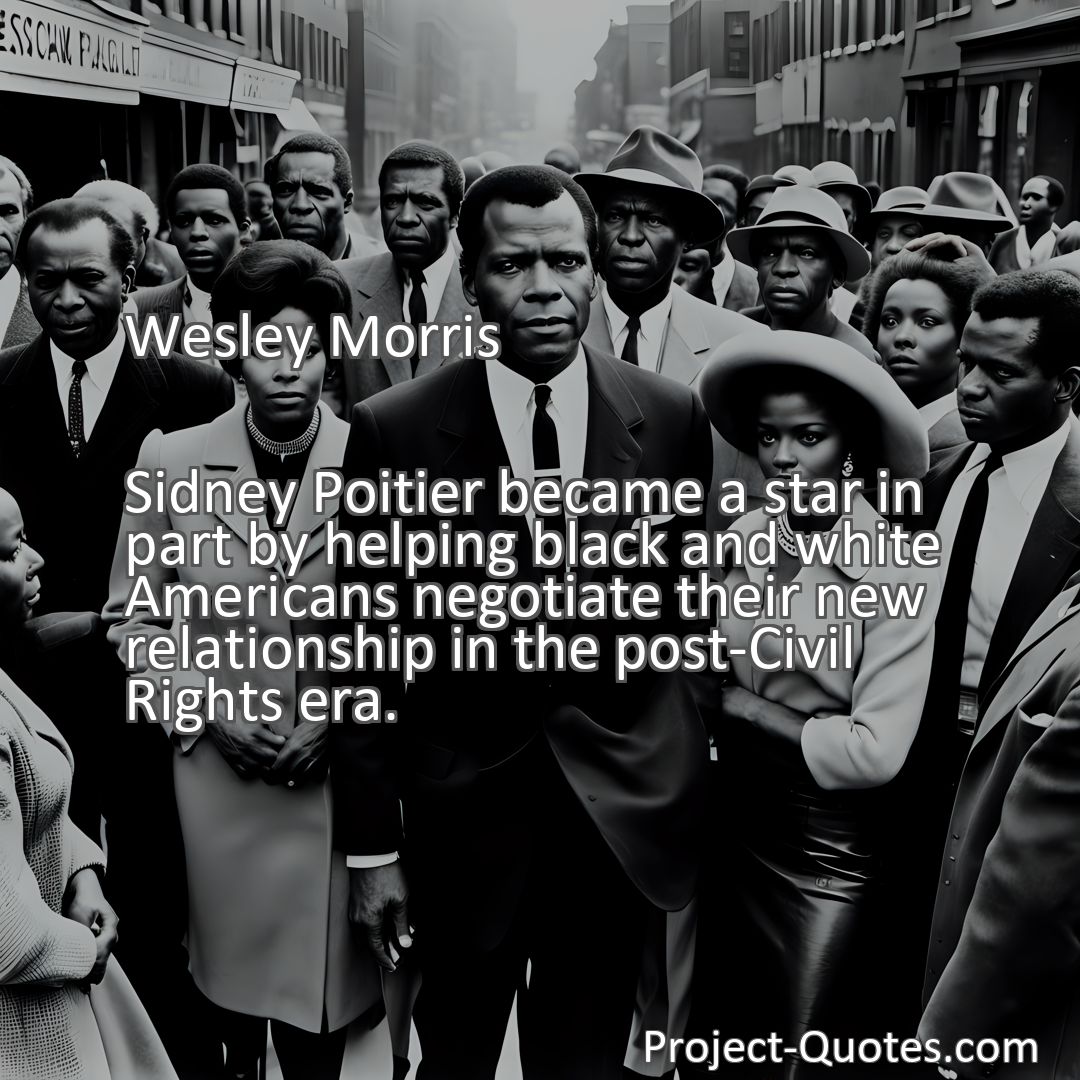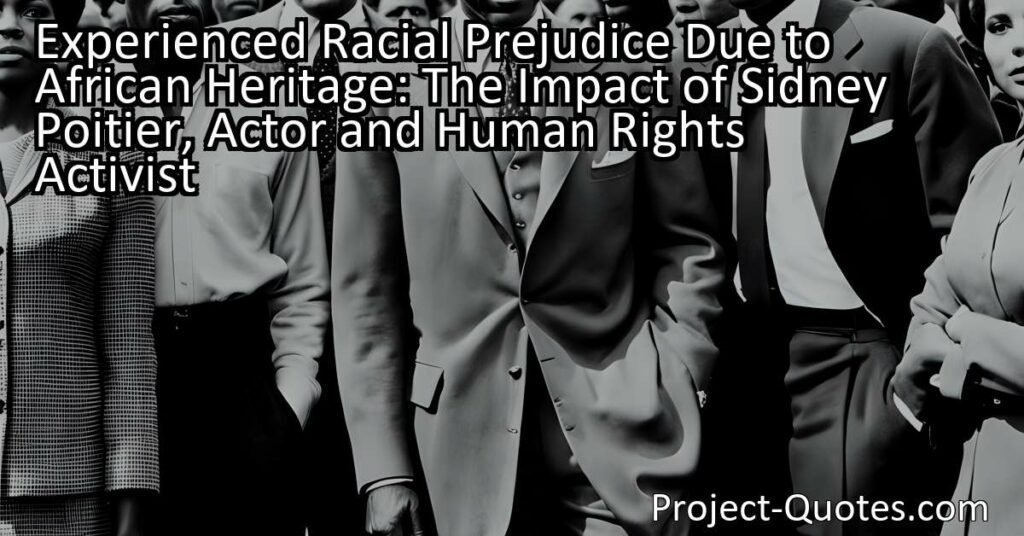Sidney Poitier became a star in part by helping black and white Americans negotiate their new relationship in the post-Civil Rights era.
Wesley Morris
Experienced Racial Prejudice Due to African Heritage: The Impact of Sidney Poitier, Actor and Human Rights ActivistSidney Poitier, an incredible actor and human rights activist, faced racial prejudice firsthand because of his African heritage. His rise to stardom coincided with the Civil Rights Movement, providing him with a unique platform to challenge stereotypes and promote racial equality. Through his iconic roles and off-screen advocacy, Poitier became a symbol of hope, fostering dialogue and encouraging empathy, understanding, and unity among Black and white Americans.
Table of Contents
- 1 Sidney Poitier became a star in part by helping black and white Americans negotiate their new relationship in the post-Civil Rights era.
- 2 Wesley Morris
- 3 Meaning of Quote – Sidney Poitier became a star in part by helping black and white Americans negotiate their new relationship in the post-Civil Rights era.
- 4 Freely Shareable Quote Image
- 5 Related
Meaning of Quote – Sidney Poitier became a star in part by helping black and white Americans negotiate their new relationship in the post-Civil Rights era.
Sidney Poitier, a remarkable actor and human rights activist, left an indelible mark on American cinema and society. Born in 1927 in Miami, Florida, Poitier grew up in the Bahamas, where he experienced racial prejudice firsthand due to his African heritage. Despite facing numerous challenges, he persevered and became a trailblazer in the film industry, breaking down barriers and promoting racial equality.
As Poitier entered the entertainment world, he found himself at a pivotal moment in American history. The Civil Rights Movement was in full swing, striving to dismantle systemic racism and secure equal rights for Black Americans. Poitier’s rise to stardom coincided with this transformative era, providing him with a unique platform to challenge stereotypes and bring people of different races together through his performances.
One of Poitier’s most iconic roles was as the character Dr. John Prentice in the 1967 film “Guess Who’s Coming to Dinner.” In the movie, Poitier portrays a successful Black doctor who wants to marry a white woman, played by Katharine Houghton. The film’s plot centers around the couple’s attempt to gain acceptance from their parents and society. “Guess Who’s Coming to Dinner” tackled the issue of interracial relationships head-on, at a time when such unions were still widely stigmatized.
Through his portrayal of Dr. Prentice, Poitier became a symbol of hope and possibility for both Black and white Americans. His dignified and charismatic demeanor challenged racial prejudices and opened up discussions surrounding interracial relationships. Poitier’s performance served as a catalyst for dialogue, encouraging viewers to question their own biases and reconsider societal norms.
Beyond “Guess Who’s Coming to Dinner,” Poitier took on a series of groundbreaking roles, often playing characters who defied racial stereotypes. In “To Sir, with Love” (1967), he portrayed a Black teacher in a predominantly white school, addressing the challenges of racial integration and mutual understanding. The film showcased the importance of empathy, compassion, and respect for one another’s differences, promoting tolerance and unity.
Poitier’s role in “In the Heat of the Night” (1967) further exemplified his commitment to advancing racial equality. The film centered around racial tensions in a small southern town, as a black detective, played by Poitier, collaborates with a white sheriff, played by Rod Steiger, to solve a murder case. The film dissected racial prejudice and underscored the notion that cooperation and empathy could bridge the divide between Black and white communities.
In addition to his on-screen contributions, Poitier used his platform to advocate for civil rights off-camera. He became actively involved in various social justice organizations, including the National Association for the Advancement of Colored People (NAACP) and the Southern Christian Leadership Conference (SCLC). Poitier’s dedication to the cause earned him respect and admiration from both Black and white Americans, solidifying his role as a cultural icon.
While Poitier’s impact on race relations wasn’t solely responsible for the progress made during the post-Civil Rights era, his influential performances and advocacy efforts undoubtedly played a significant role. By portraying strong, likable, and intelligent Black characters, Poitier challenged stereotypes and showcased the humanity of African Americans. Through his work, he encouraged empathy, understanding, and unity, allowing audiences of all backgrounds to connect on a deeper level.
Poitier’s contributions to American society extend beyond his time on the silver screen. In 2009, he was awarded the Presidential Medal of Freedom by President Barack Obama, recognizing his lifetime achievements and his unwavering commitment to social justice. This prestigious honor further solidified his status as a pioneer in the fight against racial inequality.
To this day, Sidney Poitier’s legacy endures, serving as a reminder of the power of art to effect social change. His ability to bridge the gap between Black and white Americans during a tumultuous period still resonates, reminding us of the importance of embracing diversity and fostering dialogue.
In conclusion, Sidney Poitier’s incredible journey from a small Caribbean island to Hollywood stardom allowed him to become a trailblazer during the post-Civil Rights era. Through his exceptional acting talent and unwavering dedication to civil rights advocacy, he helped black and white Americans navigate their evolving relationship. His portrayals of complex and relatable characters challenged racial stereotypes and fostered a greater understanding and acceptance of diversity. Sidney Poitier’s impact on American society cannot be overstated, as he paved the way for future generations of actors and activists to continue the fight for equality and justice for all.
I hope this quote inspired image brings you hope and peace. Share it with someone who needs it today!


